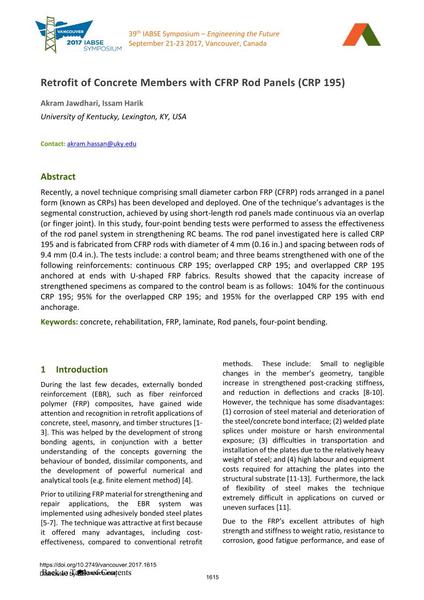Retrofit of Concrete Members with CFRP Rod Panels (CRP 195)

|
|
|||||||||||
Détails bibliographiques
| Auteur(s): |
Akram Jawdhari
(University of Kentucky, Lexington, KY, USA)
Issam Harik (University of Kentucky, Lexington, KY, USA) |
||||
|---|---|---|---|---|---|
| Médium: | papier de conférence | ||||
| Langue(s): | anglais | ||||
| Conférence: | IABSE Symposium: Engineering the Future, Vancouver, Canada, 21-23 September 2017 | ||||
| Publié dans: | IABSE Symposium Vancouver 2017 | ||||
|
|||||
| Page(s): | 1615-1622 | ||||
| Nombre total de pages (du PDF): | 8 | ||||
| Année: | 2017 | ||||
| DOI: | 10.2749/vancouver.2017.1615 | ||||
| Abstrait: |
Recently, a novel technique comprising small diameter carbon FRP (CFRP) rods arranged in a panel form (known as CRPs) has been developed and deployed. One of the technique’s advantages is the segmental construction, achieved by using short-length rod panels made continuous via an overlap (or finger joint). In this study, four-point bending tests were performed to assess the effectiveness of the rod panel system in strengthening RC beams. The rod panel investigated here is called CRP 195 and is fabricated from CFRP rods with diameter of 4 mm (0.16 in.) and spacing between rods of 9.4 mm (0.4 in.). The tests include: a control beam; and three beams strengthened with one of the following reinforcements: continuous CRP 195; overlapped CRP 195; and overlapped CRP 195 anchored at ends with U-shaped FRP fabrics. Results showed that the capacity increase of strengthened specimens as compared to the control beam is as follows: 104% for the continuous CRP 195; 95% for the overlapped CRP 195; and 195% for the overlapped CRP 195 with end anchorage. |
||||
| Mots-clé: |
béton
|
||||
